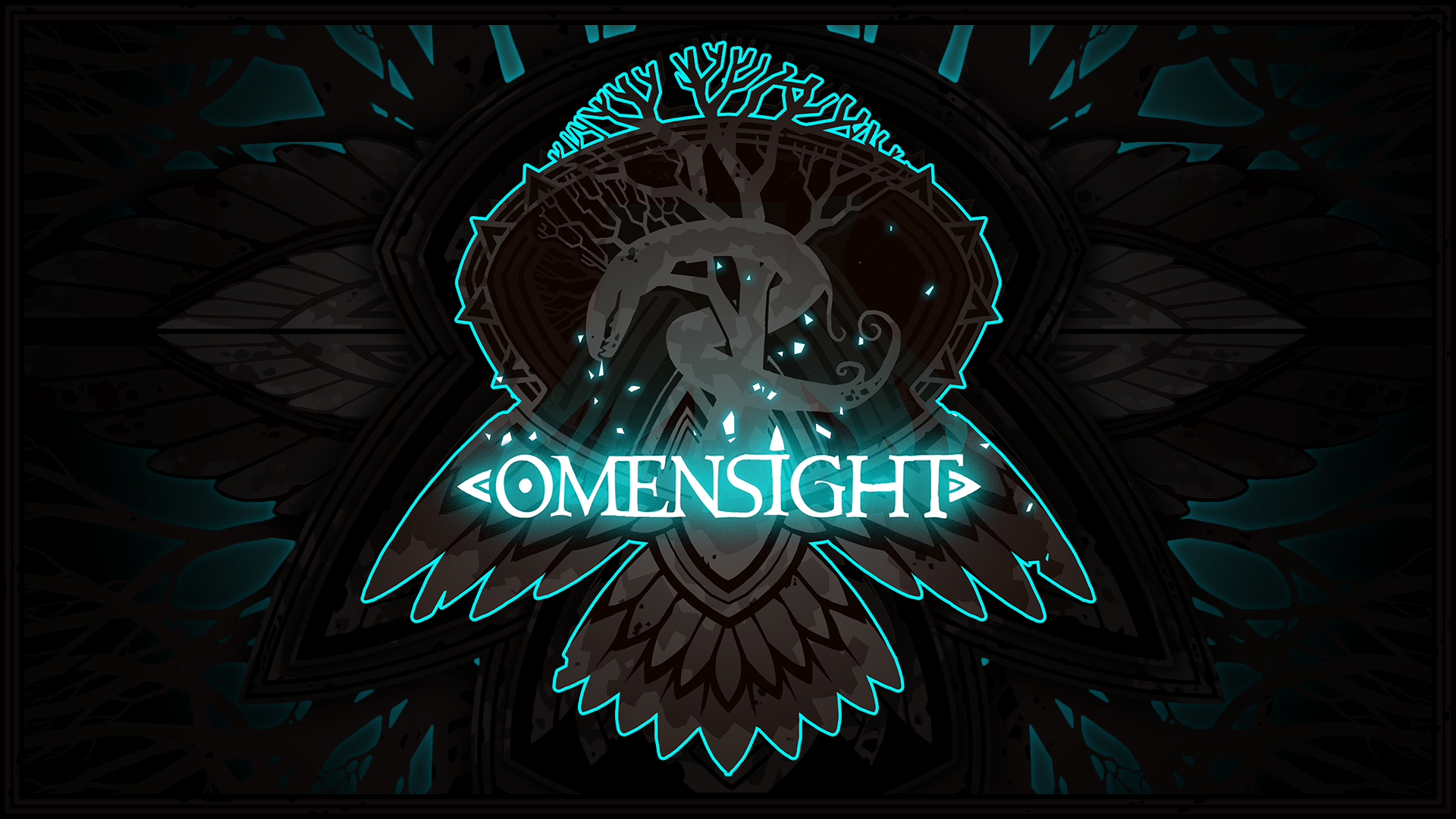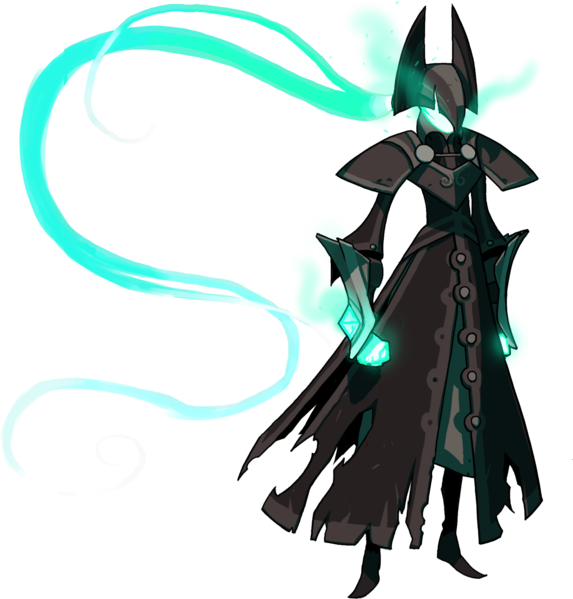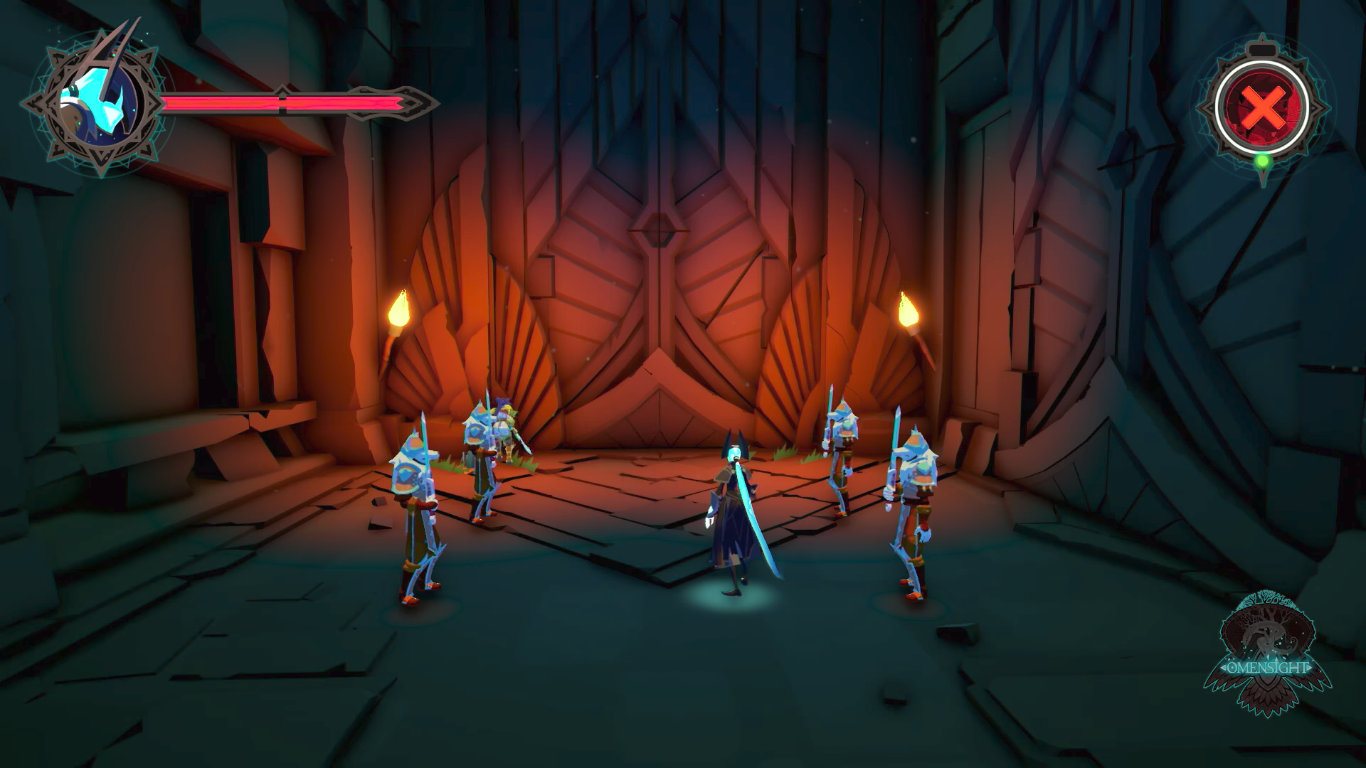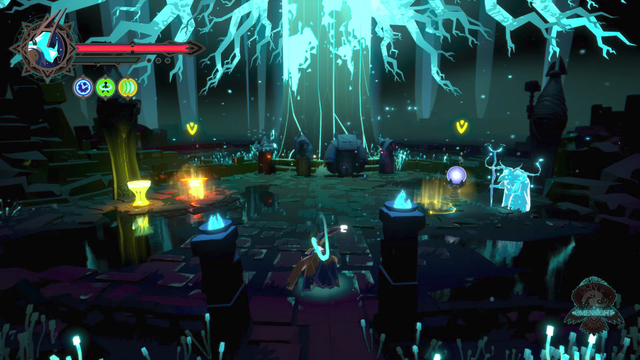Omensight Is A Worthless Experience
Spearhead Games are an independent studio that have developed precisely four titles thus far, although Stories: Path of Destinies from 2016 is the only one of those games that are of any note. The title of this article should make it pretty clear how I feel about Omensight, the latest effort from Spearhead, but if I had to be fair, I wouldn’t necessarily say Omensight is a bad game per say, rather, it’s merely one that’s existence is almost totally pointless, as the word ‘worthless’ would suggest. It’s an excellent example of how little you can do with so little.

It’s important to address the fact that Spearhead games are an independent studio, and on top of that they don’t seem to have a lot of funding. There was a two year gap between Stories and Omensight, and considering how cheeply they’ve sold both of these games, I’m a little worried that this studio is going to collapse in the near future. That aside, however, that doesn’t really exempt their games from criticism I feel. I’m not going to entertain the idea of the developers reading my criticism, this review is merely a way to express the disappointment I felt upon beating Omensight, despite not expecting much in the first place. For you see, Stories and Omensight have both received fairly positive reviews for their concepts, writing, and the way those elements affect the gameplay structure, whilst acknowledging that the games don’t have a whole lot of polish to them and get occasionally get repetitive. These criticisms apply to both games because Omensight is basically the exact same game as Stories was, (they’re also set in the same universe) only for various reasons I’ll be getting into Omensight may actually be a tad worse than that game was.
These positive reviews are a travesty and I need to set the record straight for the sake of preserving my own sanity. Yes, sure, opinions and all that, I don’t begrudge those who think differently to me, and I’m not out here to attack anybody either. Not that an opinion on Omensight of all things matters to anybody anywhere. To me, this is more of an exorcism than a proper review. I’ll be spoiling some parts of the game in this review, although thankfully there’s nothing really significant to spoil.
So, what on earth is this game? Basically, Omensight is a narrative driven third person hack and slash game that also touts itself as being a politically driven murder mystery story. You play as the Harbinger, a silent protagonist who appears just before the world is about to end. In this case, a demon called Voden devours the entire world mere moments after the tutorial is over. There’s a spirit who can send the Harbinger back in time, however, to the morning of the ending of the world. The Harbinger can choose to follow one of four characters at the start of the morning, each of whom actively oppose each other in most circumstances. Voden is here because a priestess was killed, and it’s up to the Harbinger to keep rewinding time to find out who murdered her and put a stop to the end of the world.

If I was a hack who could only talk in terms of comparisons to other media, then I’d say that Majora’s Mask is the Dark Souls of Omensight. Because comparing Omensight to Majora’s Mask does a disservice to Majora’s Mask. Whereas Majora’s Mask gave you a big 3D world to explore that was filled with side quests and a central hub town where you could memorise every character’s normal routine, Omensight is a strictly linear affair. Once you’ve chosen a character to start the day with you effectively have no further choices to make and can only follow the day to its conclusion in the hopes that you’ll get some new story details that will advance your understanding of the plot, or a new power that will help you unlock locked doors throughout the levels. And all you can really do in these levels is move forward and engage in fights, they’re not open environments that promote exploration, and what few secrets there are tend to be very easy and unengaging to find. There’s no NPCs to talk to or other activities besides fighting to engage in besides listening to the character you’re currently following and occasionally participating in some simplistic platforming.
In terms of combat, it’s passable. It plays like a slightly more enjoyable version of a PS2 or PS3 movie licensed game, where you’re surrounded by a bunch of enemies at all times, and you can kinda just button mash your way through them. The positives of the game are that the Harbinger feels pretty weighty to control, and since you don’t have a guard button your only choice is to dodge attacks, which feels pretty satisfying, especially since time slows down a bit when dodging an enemy attack. I played the game on ‘True Harbinger’ difficulty, which is the most difficult setting, and had one of the easiest times of my life. That’s not me gloating, either, I think almost anybody could play the game on this difficulty setting. This is largely because the game gives you access to some special attacks, namely the one which lets you slow down time, which lets you utterly cheese basically everything in the entire game since enemies and bosses alike can barely move in its active radius. The only time the game killed me was during some boss fights, but each time the death felt rather cheap. Some fights, especially the final boss, have platforms that fall away beneath your feet, which can kill you instantly. Some bosses have attacks that they continuously spam that they use with no real animation telegraphs while you’re right on top of them and attacking them, even if you do use the slow time ability (which you always will be.) There’s also no way of healing mid-fight, unless the boss happens to have breakable barrels in the room containing health pickups. If you die, you’ll also enter the boss room with however much health you had before entering the first attempt, meaning if there’s no health pickups either before or during the boss fight, you might not have full health for the duration of the fight. It’s passable combat, but it also feels like something the game could have completely dropped in favour of just presenting a visual novel story. As is, the combat (and gameplay as a whole) feels like filler to pad out gametime, which isn’t helped by the fact that you’ll be repeating the same four or so levels over and over again. When the gameplay in your fun and interactive video game feels like filler that’s only there to keep your hands busy between dialogue segments, I think that’s when you need to try again. Literally the only reason to play the game is for the story, and it’s a completely perfunctory story, so let’s get into it proper.

The game’s big feature feature besides being able to choose which character you start the day with is the game’s titular system, the omensights. An omensight is a short vision of a past event that the Harbinger can show to one of the characters at the start of a day, which is how you alter the actions they take. When I first learned of this system my assumption was that I’d be be given a bunch of different omensights throughout the game and I’d have to get into the character’s heads to figure out which vision would trigger what actions. I thought there might be false visions that you could give to the characters, essentially lying to them, in order to trigger actions that will earn you more information, and that you’d eventually have a large collection of visions. Turns out there’s only three omensights in the entire game. I could live with that, but even despite there being so few omensights to use, the game infuriatingly doesn’t let you choose which omensight you want to show the characters at the start of a day. Instead, your newest omensight overrides the old one automatically. The annoying part about this is that I found the first omensight before I was able to see one of the characters ‘default’ days. The character in question, Ratika, for some reason gets possessed by a spirit of darkness under normal circumstances, but in my playthrough I was never able to figure out how or why this happens because the game locked me out of seeing it, and her possession never at any point becomes relevant again after obtaining the first omensight.
To put the final nail in the coffin, there’s only one path to take to obtain a new omensight, or a new seal unlock, and you’re only required to interact with two of the four characters on a given ‘chapter’ in order to advance the plot. This essentially results in a game that presents itself as being highly choice driven, however, the game actually ends up being one of the most linear games I’ve ever played. It’s also a linear game that might trick you into tackling totally worthless content, since completing a character’s day that doesn’t directly advance the plot doesn’t gain you any new plot or gameplay advantages besides a huge, obvious hint that tells you the character you’re supposed to pick, as if process of elimination and a bare minimum of deductive reasoning wasn’t an effective enough method of figuring out the right path.
Being linear wouldn’t be too bad, but I don’t feel like the developer’s intentions were for the game to be like this. Instead, it feels like the game’s ambitions outstripped its budget and competency. The tragic thing, however, is that I feel Stories: Path of Destinies was much better at making you feel like your choices matter. While that game also funneled you towards a singular, linear ending, it felt more in line with the themes of that game. For one, you were playing a character who didn’t have a definitive objective in that game. A rogue with actual speaking roles who wasn’t entirely honest with his emotions, and had no obligations towards anyone. Decisions in that games felt more like moral decisions that actually reflected on his character. By the end of the game, it feels like he’s grown enough as a character and has seen enough of the potential paths his life may go that he was able to take his life in a direction that he wasn’t expecting to go in at the start of the game. In Omensight, you might feel bad that as the Harbinger you can make the decision to kill a good person for the sake of earning information, but that choice doesn’t really say anything about the player or the Harbinger’s character. Mostly because it’s literally the only choice either me or the Harbinger can make in order to progress the story, and there’s basically no consequences to the Harbinger’s actions even before the day is reset, so their death isn’t even relevant or impactful anyway. The game never really makes a point about what being able to reset the apocalypse actually feels like, there’s no moment equivalent to Anju and Kafei quest in this game. Not because the game tries and fails, but because it doesn’t try at all. Good games are expensive to make, but engaging writing only requires competence. I know this studio can do better with what is has.
As for the plot and characters themselves, there’s not much to say here. The plot basically revolves around the Harbinger gaining omensights that points a finger at one of the four characters, claiming they’re the person who murdered the priestess, which gets the different characters, who were already on opposing sides, fighting each other. There’s Ludomir, a drunken bear who wants to kill Indrik, the tyrannical emperor of an empire that’s at war with a group of resistance fighters lead by Ratika, and at the start of the day she instigates a riot in her prison which forces Draga, one of Indrik’s generals, to quell the riot. You can follow one of these four characters from the start of the day, although Indrik doesn’t become available to follow until about halfway through the game. The issues with the characters largely comes down to the way the player might choose to progress through the game. For example, if you’re like me, I was able to instinctively realise which characters I’d need to follow to progress the plot. (not particularly hard when I have a 50% of picking one of the right characters after obtaining a new omensight) This results in characters like Draga basically becoming completely worthless about halfway through the game, as you never need to go with her after obtaining the second omensight. Ludomir has some degree of intrigue surrounding him, namely during a scene where he expresses remorse for the priestesses’ death, since he was close to her. Indrik eventually apologises for his actions as an emperor, but it rings hollow when we don’t get to see how he actually rules his kingdom outside of war time. The game wants you to infer that he’s tyrannical, but every time you meet him he immediately shows himself to be the type of person who jumps to diplomacy before violence. As such, as far as I can tell there doesn’t seem to be any reason for Ratika or Ludomir to hate him, besides the fact that they think he killed the priestess even though they have literally no evidence that he did so.
The result is that there’s basically no narrative ideas that are worth salvaging. What’s here might serve as the basis for a good narrative, something that could be built upon. But there’s almost nothing within the actual text that could be expanded upon. To make the story better, brand new elements would have to be added- any suggestions I could make would likely result in me writing an almost completely different story, which defeats the point of trying to critique what’s actually there. Nowhere is the game’s emptiness more apparent than when you consider the question of what the game is even about. As in, thematically. The only thing I can infer is that it suggests godlike beings such as the Harbinger have the power to improve the living conditions of mortals, but their only obligation is towards protecting the world from bigger picture, world ending threats. The loop in which you actually beat Voden barely has the Harbinger interacting with any of the characters at all, besides Ludomir, meaning that all the development they underwent in other routes is completely null and void, and the world being saved doesn’t mean that they eventually get to grow as people anyway, because they all die or get possessed shortly after Voden’s defeat. The result is that the world gets saved, but nobody knows you’ve saved it, and for all they know or care the Harbinger hasn’t done anything to help them in a more direct, tangible way.
As such, the world continues, but it doesn’t improve or really change all that much. That sort of glib nihilism doesn’t really gel with me. It might have been cool if it was intentional, pointed, thoughtful, or entertaining nihilism. As is, the result is a game that offers nothing, believes in nothing, and affects nothing. It makes me feel depressed for all the wrong reasons.
The graphics sure are pretty, though!

Narrative-driven video game, idk. A strong narrative can accentuate a game, but it will almost never make up for bad gameplay if you ask me. Just make TV shows if you don't want to make a fun game.
RPG maker games are an exception to me because I like the turn-based combat. It gets me in a sort of zen mood.
Well, a TV show can't include viewer choice like a game can. TV is also really expensive. I otherwise agree though, however in my case I'd rather they devote their resources to creating a visual novel or a walking simulator instead of a lukewarm action title.
Hello @alberenza, thank you for sharing this creative work! We just stopped by to say that you've been upvoted by the @creativecrypto magazine. The Creative Crypto is all about art on the blockchain and learning from creatives like you. Looking forward to crossing paths again soon. Steem on!
Congratulations @alberenza! You have completed some achievement on Steemit and have been rewarded with new badge(s) :
Click on any badge to view your own Board of Honor on SteemitBoard.
For more information about SteemitBoard, click here
If you no longer want to receive notifications, reply to this comment with the word
STOP